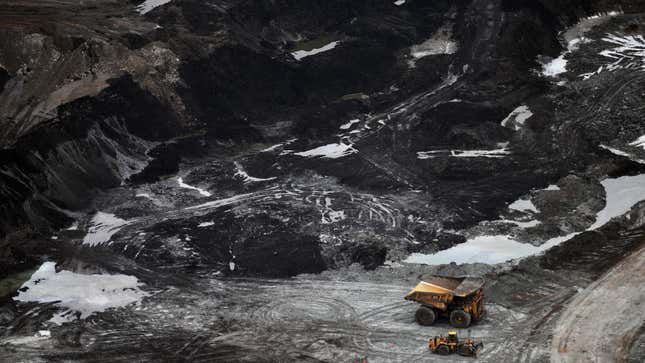
In the middle of Canada’s majestic boreal forests, Vancouver-based Teck Resources Limited had proposed building one of the world’s largest oil sands mines. The Frontier Project would’ve stretched across more than 72,000 acres in Alberta, mining an area roughly the size of Arches National Park in Utah.
On Sunday, however, the company abruptly withdrew its proposal from Canada’s regulatory review process. And it wasn’t because of the heavy opposition the project faced from First Nations peoples and even Nobel laureates. No, the company said the money just wasn’t looking right when it announced its decision. It’s another sign of the turning economic tide against fossil fuels at large, but especially for oil sands, the nastiest and costliest of them all.
The Frontier Project was set to produce some 260,000 barrels of oil a day. The Canadian government estimates the project would have emitted 4 megatons of carbon a year though the Pembina Institute, an energy-focused think tank in Canada, estimates the number would’ve been closer to 6 megatons annually. Either amount is more than the entire country of Iceland emits in a year.
The risks those emissions posed weren’t an issue for Teck. But the risks of financial losses were, which is why it pulled the plug on the project. In a letter to Jonathan Wilkinson, Canada’s minister of environment and climate change, Teck CEO Don Lindsay explained why the company was withdrawing it proposal (emphasis added):
“However, global capital markets are changing rapidly and investors and customers are increasingly looking for jurisdictions to have a framework in place that reconciles resource development and climate change, in order to produce the cleanest possible products. This does not yet exist here today and, unfortunately, the growing debate around this issue has placed Frontier and our company squarely at the nexus of much broader issues that need to be resolved. In that context, it is now evident that there is no constructive path forward for the project. Questions about the societal implications of energy development, climate change and Indigenous rights are critically important ones for Canada, its provinces and Indigenous governments to work through.”
What’s most fascinating about this whole situation is this so-called reconciling, as Teck put it, resource development and climate change. Lindsay almost appears to blame the Canadian and Albertan governments for the project’s failure by not having systems in place to ensure the project could succeed.
The only way to make such a costly development project work financially would be through even more government subsidies, Bronwen Tucker, an Edmonton-based analyst for Oil Change International, told Earther in an email. That’d be foolish during a time when financial institutions—such as Goldman Sachs and Blackrock, the world’s largest investment firm—are turning away from funding fossil fuels. And of course, it’s especially foolish given the risks posed by digging up more coal, oil, and gas and polluting the atmosphere with carbon dioxide.
“You can’t ‘reconcile’ resource development and climate change when the resource is a new fossil fuel project,” Tucker said. “Much less a tar sands project.”
Producing tar sands is super energy-intensive and, thus, worse for the planet than your average oil. Every barrel of oil produced from tar sands can emit up to 1,622 pounds of carbon. For reference, the light oil coming out of southern Texas fields emits nearly 40 percent less carbon per barrel. Neither is doing the planet any good, but why waste time and money on literally the worst type? Seems like Teck and its investors asked the same question.
Now, it could be time for Alberta to do the same. The province’s economy is reliant on fossil fuel production, and Jason Kenney, its premier, is all in on continuing down that path. Teck’s decision to withdraw its proposal is another sign that path just doesn’t make sense anymore.
“The kind of framework that we need from government is one for a just transition that protects workers and communities,” Tucker told Earther. “Almost any other sector provides more jobs per investment than oil and gas. But in Alberta, we’ve never told another story of what’s possible.”
The province’s Federation of Labour President Gil McGowan echoed that sentiment. He issued a statement calling on the government of Alberta to use this moment as a lesson about the future of the region’s economy and dependence on oil sands.
“What this means is that the future of our oil and gas sector here in Alberta depends on us taking climate change much more seriously and putting much more rigorous policies in place to reduce emissions,” the statement read. “Taking climate change seriously is no longer an environmental imperative; it is now an economic imperative for our province.”
At a time when scientists have made it clear to world leaders that now is the time to dramatically reduce greenhouse gas emissions, the death of this project is a major win to anyone who cares about the future of the planet and humanity. And the fact that it was the economics that caused the company to pull out of thee project shows fossil fuels are starting to not make sense financially anymore.
“[Teck’s] withdrawal of the project is a sound business decision,” Tom Sanzillo, director of finance for the Institute for Energy Economics and Financial Analysis, told Earther. “The finance and economics of oil sands development cannot work in the current market because the prices are too low and the costs of extraction of oil sands are too high.”
The end of this project won’t mean the death of fossil fuels at large—but it’s a major blow. It brings us one step closer to an economy that prioritizes the health and well-being of communities instead of a company’s bottom line. In this case, though, Teck’s bottom-line was in sync with what would be best for the health of local residents and the climate. Now, what the people of Alberta need is a transition to ensure their financial well-being in a new economy free of fossil fuels.